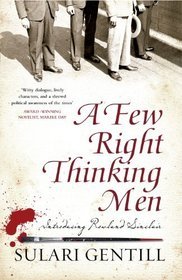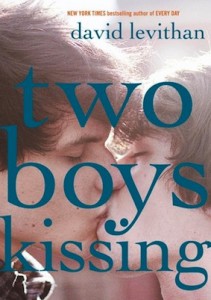Complicated Disclaimer: I read this book when it was in copyedited manuscript form. I didn’t know the author, but the book’s editor knows the agent who sold the Montmaray books to Knopf (who is not really ‘my’ American agent, but my Australian publisher’s agent – I did say that this would be a complicated disclaimer). I was asked to read the manuscript so that if I liked it, a quote from me could go on the book jacket. I’ve been asked to do this before, and as always, I made it very clear to the editor that I could only provide a complimentary quote if I loved the manuscript. And this is the first time I’ve actually provided a quote for a book jacket, so there you go.
 Prisoner of Night and Fog is set in Munich in 1931, as Adolf Hitler begins his rise to power. Gretchen is the perfect Aryan girl, having grown up absorbing Nazi ideology. Her father fought alongside Hitler in the trenches of the First World War and then gave up his life to protect Hitler during the failed Nazi Putsch of 1923, so Gretchen has always been a special favourite of Hitler’s. She’s also close to Hitler’s beloved niece Geli, although her best friend is a sweet young woman named Eva Braun who works in the camera shop frequented by Hitler and his associates. It’s true that Gretchen has some difficulties – money has been tight, her mother wants Gretchen to give up her dreams of attending university, her brother Reinhard can behave very strangely sometimes – but she knows everything will be wonderful once the Nazis are in control of the country, especially as Reinhard seems to have found a sense of purpose among the SA Brownshirts. Then a young journalist called Daniel Cohen turns her life upside-down by a) revealing a terrible secret involving her father, and b) being incredibly handsome and clever and kind, even though he’s a Socialist, a sworn enemy of Hitler and, worst of all, a Jew.
Prisoner of Night and Fog is set in Munich in 1931, as Adolf Hitler begins his rise to power. Gretchen is the perfect Aryan girl, having grown up absorbing Nazi ideology. Her father fought alongside Hitler in the trenches of the First World War and then gave up his life to protect Hitler during the failed Nazi Putsch of 1923, so Gretchen has always been a special favourite of Hitler’s. She’s also close to Hitler’s beloved niece Geli, although her best friend is a sweet young woman named Eva Braun who works in the camera shop frequented by Hitler and his associates. It’s true that Gretchen has some difficulties – money has been tight, her mother wants Gretchen to give up her dreams of attending university, her brother Reinhard can behave very strangely sometimes – but she knows everything will be wonderful once the Nazis are in control of the country, especially as Reinhard seems to have found a sense of purpose among the SA Brownshirts. Then a young journalist called Daniel Cohen turns her life upside-down by a) revealing a terrible secret involving her father, and b) being incredibly handsome and clever and kind, even though he’s a Socialist, a sworn enemy of Hitler and, worst of all, a Jew.
Anne Blankman does an excellent job of weaving real historical events and people into a thrilling fictional murder mystery. She’d clearly done a tonne of research, but it didn’t come across as information-dumping to me. There are also detailed author notes at the end of the book, providing background information about the real-life people in the book and including a long bibliography for those who’d like to read more. I found the setting fascinating, but this is also a really engrossing story. Gretchen and Daniel are brave and believable protagonists, and even the minor characters had depth. Gretchen’s mother, for example, is weak-willed and easy to despise, but she’s also shown to be someone forced by circumstances to make some impossible, heartbreaking choices. I can’t truthfully say I ‘enjoyed’ the book, because the events were so horrifying (if it’d been a film, I’d have watched the second half with my fingers over my eyes, shouting things like, “Don’t go into that cellar, Gretchen!” and “Run, Gretchen, RUN!”). This is not a book full of warmth and humour. It’s dark and grim and occasionally shocking in its violence (although this shouldn’t really be surprising, given that most of the characters are Nazis). There is a bit of romance, but mostly the lovers are too busy fleeing murderous thugs to enjoy their developing relationship. It’s difficult to discuss the plot in much detail without providing spoilers, but I will say I found the conclusion satisfying – even though it’s clear the story isn’t quite over, and in fact, the author is working on a sequel. Recommended to readers who enjoy historical fiction, particularly those craving mystery and excitement, and those with an interest in twentieth-century European history.
Read More: An interview with Anne Blankman about the historical background to Prisoner of Night and Fog.
You might also be interested in reading:
Goodbye to Berlin by Christopher Isherwood
The Mitfords: Letters Between Six Sisters, edited by Charlotte Mosley






 I read some great grown-up novels this year. This may have been because I abandoned my usual method of choosing novels from the library (that is, selecting them at random from the shelves based on their blurbs) and started reserving books via my library’s handy online inter-library loan system, basing my choices on reviews, award short-lists and personal recommendations. I was happy to discover the novels of
I read some great grown-up novels this year. This may have been because I abandoned my usual method of choosing novels from the library (that is, selecting them at random from the shelves based on their blurbs) and started reserving books via my library’s handy online inter-library loan system, basing my choices on reviews, award short-lists and personal recommendations. I was happy to discover the novels of 
 A Few Right Thinking Men by
A Few Right Thinking Men by  Two Boys Kissing by
Two Boys Kissing by